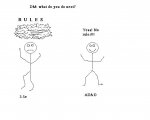Remathilis
Legend
PnP brings up my great complaint with 2e's Non-Weapon Proficiency System (used similarly in 1e and the RC); the abilities were static. Additionally, NWPs were binary; you knew how to do it (you had prof) or you didn't.
For example, someone who took the music instrument (lute) NWP could play the lute. The check was dexterity with a -1 to the roll (meaning if you had a 15 dex, you needed to roll under a 14 to succeed). If you weren't trained in lute-playing (no nwp) you couldn't do it; there was no "untrained" ability.
Which was fine for lute-playing, but got ridiculous for swimming, sewing, fire-building, cooking, fletching, and other mundane tasks. And since they were ability checks; they never improved beyond improving your score (or spending another NWP slot to gain a +1, a waste of a slot if there ever was one).
Compared to such a bass-ackwards system, 3e's skill-point system seemed like a godsend.
For example, someone who took the music instrument (lute) NWP could play the lute. The check was dexterity with a -1 to the roll (meaning if you had a 15 dex, you needed to roll under a 14 to succeed). If you weren't trained in lute-playing (no nwp) you couldn't do it; there was no "untrained" ability.
Which was fine for lute-playing, but got ridiculous for swimming, sewing, fire-building, cooking, fletching, and other mundane tasks. And since they were ability checks; they never improved beyond improving your score (or spending another NWP slot to gain a +1, a waste of a slot if there ever was one).
Compared to such a bass-ackwards system, 3e's skill-point system seemed like a godsend.




